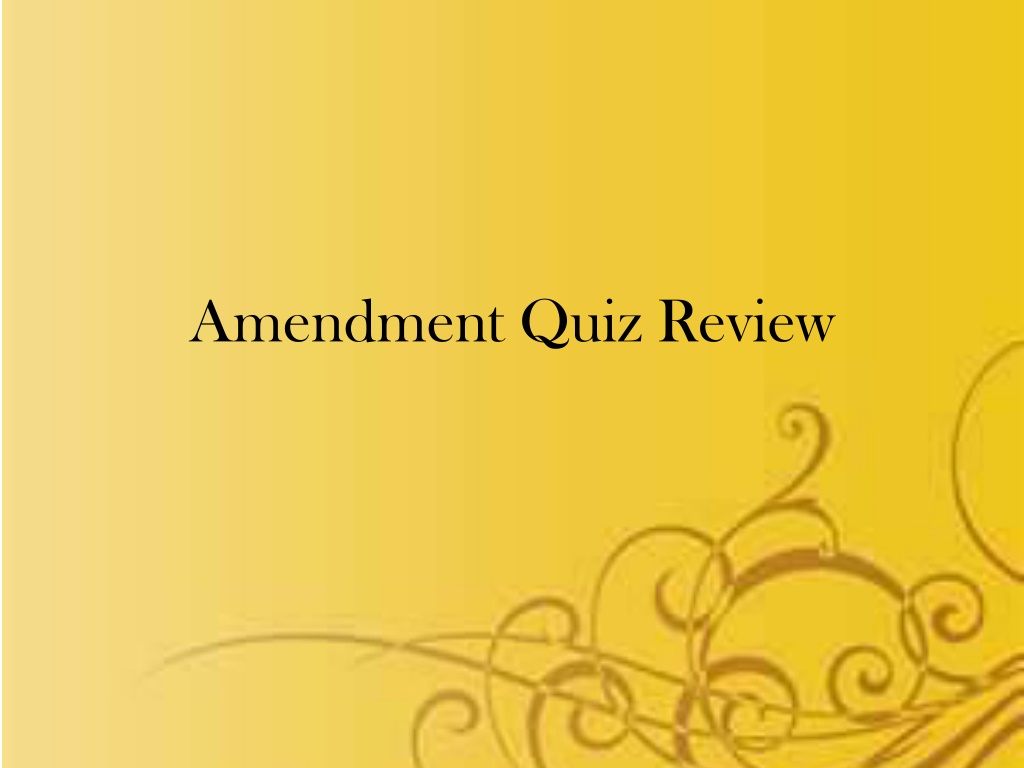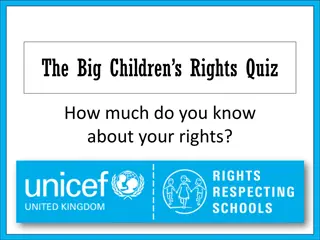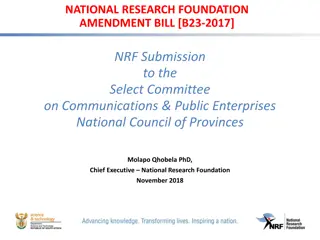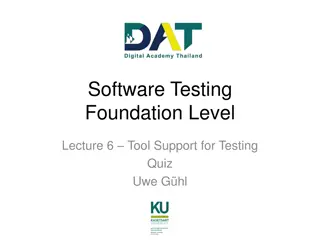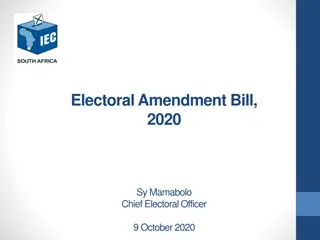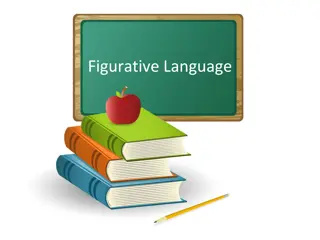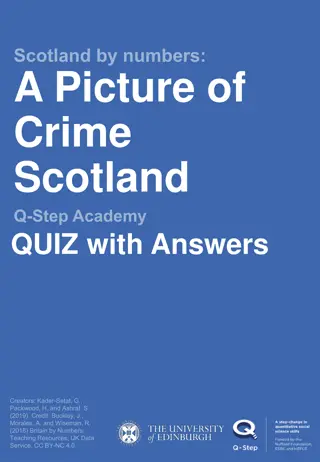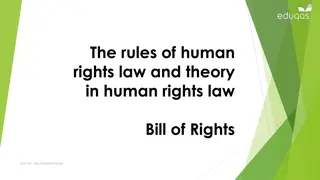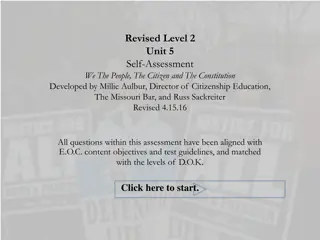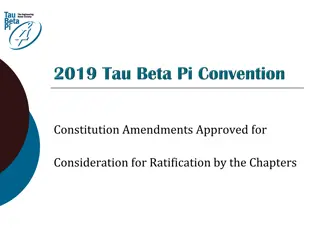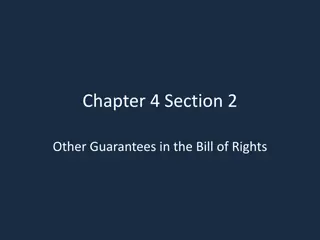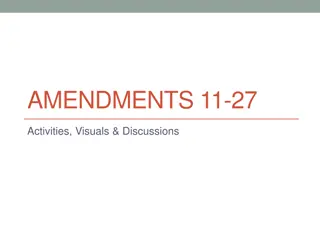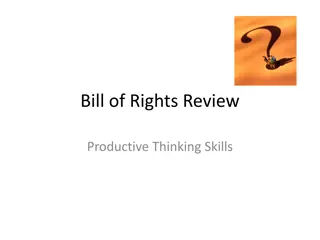Amendments Quiz Review: Test Your Knowledge of the Bill of Rights
Test your knowledge of the Bill of Rights with this quiz reviewing key amendments such as the right to remain silent, bear arms, speedy trial, and more. Identify each amendment based on provided descriptions and hints to gauge your understanding of these fundamental constitutional rights.
Download Presentation

Please find below an Image/Link to download the presentation.
The content on the website is provided AS IS for your information and personal use only. It may not be sold, licensed, or shared on other websites without obtaining consent from the author. Download presentation by click this link. If you encounter any issues during the download, it is possible that the publisher has removed the file from their server.
E N D
Presentation Transcript
Which Amendment? No person shall be held to answer for a capital, or otherwise infamous crime, unless on a presentment or indictment of a Grand Jury. Nor shall any person be subject for the same offence to be twice put in jeopardy of life or limb; nor shall be compelled in any criminal case to be a witness against himself. Hint: The right to remain silent
Which Amendment? The right of the people to keep and bear Arms, shall not be infringed Hint: The right to bear arms
Which Amendment? Excessive bail shall not be required, nor excessive fines imposed, nor cruel and unusual punishments inflicted. Hint: No cruel and unusual punishment
Which Amendment? Congress shall make no law respecting an establishment of religion, or prohibiting the free exercise thereof; or abridging the freedom of speech, or of the press; or the right of the people peaceably to assemble, and to petition the Government for a redress of grievances. Hint: Freedom of Speech, Press, Religion, and Petition
Which Amendment? In all criminal prosecutions, the accused shall enjoy the right to a speedy and public trial, by an impartial jury of the State and district wherein the crime shall have been committed. Hint: Speedy trial
Which Amendment? The powers not delegated to the United States by the Constitution, nor prohibited by it to the States, are reserved to the States respectively, or to the people. Hint: Powers to the states
Which Amendment? The right of the people to be secure in their persons, houses, papers, and effects, against unreasonable searches and seizures, shall not be violated, and no Warrants shall issue, but upon probable cause, supported by Oath or affirmation, and particularly describing the place to be searched, and the persons or things to be seized. Hint: No illegal search and seizure
Which Amendment? The enumeration in the Constitution, of certain rights, not be construed to deny or disparage others retained by the people. Hint: Powers to the people
Which Amendment? In suits at common law, where the value in controversy shall exceed twenty dollars, the right of trial by jury shall be preserved, and no fact tried by a jury, shall be otherwise reexamined in any Court of the United States, than according to the rules of the common law. Hint: Trial by jury
Which Amendment? No Soldier shall, in time of peace be quartered in any house, without the consent of the Owner, nor in time of war, but in a manner to be prescribed by law. Hint: No quartering (or housing of) soldiers
Executive, Judicial, or Legislative? Terms of service can last no longer than 10 years
Executive, Judicial, or Legislative? Terms last a lifetime, as long as there is no misbehavior
Executive, Judicial, or Legislative? There are no qualifications to serve in this branch
Executive, Judicial, or Legislative? Has the ability to declare war
Executive, Judicial, or Legislative? Has the ability to impeach judges or the President
Executive, Judicial, or Legislative? Has the ability to carry out or enforce the laws
List 2 of the Powers of the Articles of Confederation Each state has one vote Powers included: Declaring war Raising an army and navy Making treaties Borrowing money Establishing a postal system Conducting business with Native Americans and other countries
Weaknesses of the Articles National government was much weaker than the state governments Had no authority over individual citizens and very little control over state governments Could make laws, but the writers provided no measures to carry out those laws (Articles left it to the states to enforce laws passed by Congress) Made no provision for a court system )if the states disagreed, they had no place to resolve their differences)
Weaknesses of the Articles Every state could send delegates to Congress, but each state (whatever its size) had only one vote Larger states viewed this as unfair Congress held powers to war and peace, however, they didn t have the power to collect taxes .so . No requirement of the states to send money Known as a shadow without substance
Define checks and balances All branches of government do not have complete power Presidential (exec.) check on Congress (leg.) - veto - keep bill from becoming law Congress (leg.) check on Executive - override President - veto, but 2/3 both house Judicial check - Supreme Court decides on meaning of laws & against Constitution Legislative check on Executive - impeach the president
